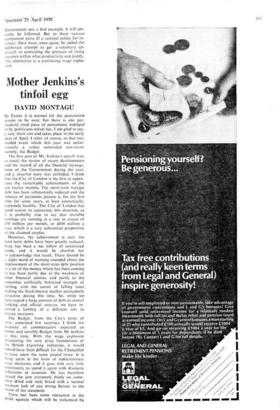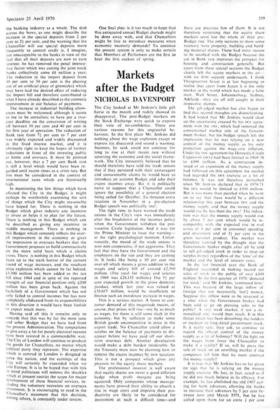Mother Jenkins's tinfoil egg
DAVID MONTAGU
By Easter it is normal for the pantomime season to be over, but there is one par- ticularly tired piece of pantomime indulged in by politicians which has, I am glad to say, a very short run and takes place in the early days of April. I refer, of course, to that out- moded event which this year was unfor- tunately a rather outmoded non-event, namely, the Budget.
The first part of Mr. Jenkins's speech was, as usual, the review of recent developments and the record of all the financial manage- ment of the Government during the year, and a cheerful story was unfolded. 1 think that the City of London is the first to appre- ciate the remarkable achievements of the last twelve months. The short-term foreign debt has been substantially reduced and the balance of payments picture is, for the first time for some years, at least cosmetically, extremely healthy. The City of London has good reason to appreciate this situation, as it is probably true to say that invisible earnings are running at a rate in excess of £50 million per month, or £600 million a year, which is a very substantial proportion of the claimed surplus.
However, the achievement is real: the short-term debts have been greatly reduced, there has been a net inflow of uncovered funds, and it would be churlish not to acknowledge this result. There should be a slight word of warning sounded about the improvement of the short-term debt position as a lot of the money which has been coming in has been partly due to the weakness of other financial centres, and partly to the somewhat artificially bolstered strength of sterling, with the carrot of falling rates making the fixed interest market particularly attractive during this time. So, while we have repaid a large amount of debt to central banking and official sources, we have in- curred a liability of a different sort to private investors.
The Budget, from the City's point of view, contained few surprises. I think the majority of commentators expected an honest and sensible Budget from Mr Jenkins at this time. With the wage explosion threatening the very price foundations of the British exporting industries, it would indeed have been difficult for the Chancellor to have spent the same pound twice. It is being spent in the form of indiscriminate Wage increases, and it gave him very little opportunity to spend it again with dramatic reductions in taxation. He has therefore spread the jam extremely thinly on some- what dried and stale bread with a natural resultant lack of any strong flavour to the whole of his statement.
There has been some relaxation in the Credit squeeze which mill be welcomed by the banking industry as a whole. The shot across the bows, as one might describe the increase in the special deposits from 2 per cent to 24 per cent, and the warning that the Chancellor will use special deposits more frequently to control credit is, I imagine, not unacceptable to the banks in view of the fact that all their deposits are now to earn interest: he has removed the penal interest- free factor which was costing the joint stock banks collectively some £8 million a year: The reduction in the import deposit from 40 per cent to 30 per cent is the phasing out of an artificial piece of gimmickry which may have had the desired effect of reducing the import bill and therefore contributed to what I have already described as the cosmetic improvement in our balance of payments.
The increase in industrial building allow- ances must be welcomed, although it seems to me to be unrealistic to have put a two- year deadline on the concession of writing off between 30 per cent and 40 per cent in the first year of operation. The reduction of Bank rate from 74 per cent to 7 per cent was widely expected and widely discounted in the fixed interest market, and it is obviously right to keep the hopes of further reductions in front of the investing public at home and overseas. It must be pointed out, however, that a 7 per cent Bank rate is still a level which would have been re- garded until recent times as a crisis rate. But this must be considered in the context of international rates which are historically high.
In mentioning the few things which have affected the City in the Budget, it might perhaps be worthwhile examining the sort of things which the City might reasonably have hoped for. There is nothing in the Budget which gives industry any incentive to invest or helps it to plan for the future. There is nothing in this Budget which can be described as giving any incentive to middle management. There is nothing in this Budget which remotely reflects the over- all improvement in the economy or gives the impression to overseas bankers that the Government proposes to build constructively on the more solid basis which it claims exists. There is nothing in this Budget which faces up to the stark horror of the current round of wage increases, and the resultant price explosion which cannot be far behind. £3,300 million has been added to the tax bill since 1964 and in spite of the reported strength of our financial position only £200 million has been given back. Against the backcloth of a Government which has not only failed to control incomes but has now completely abdicated from its responsibilities in this direction it would have been foolish to expect much more.
Having said all this it remains only to concede that this was by far the most sane and sober Budget that we have had from the present Administration. The temptations to give away a lot for purely electoral reasons have been resisted in a commendable way. l'he City of London will continue to produce the goods for Chancellors, no matter which political party they represent. The expertise which is centred in London is designed to serve the nation, and the earnings of the City will certainly be expanded when we join Europe. It is to be hoped that with this in mind politicians will remove the shackles which at present restrict the scope for major development of these financial services, in- cluding the voluntary restraints on overseas investment. It is encouraging to read in the Chancellor's statement that this decision, among others, is constantly under review. One final plea: is it too much to hope that this antiquated annual Budget charade might be done away with, and that Chancellors might be free to introduce measures when economic necessity demands? To continue the present system is only to make certain that Members of Parliament are the first to hear the first cuckoo of spring.







































 Previous page
Previous page